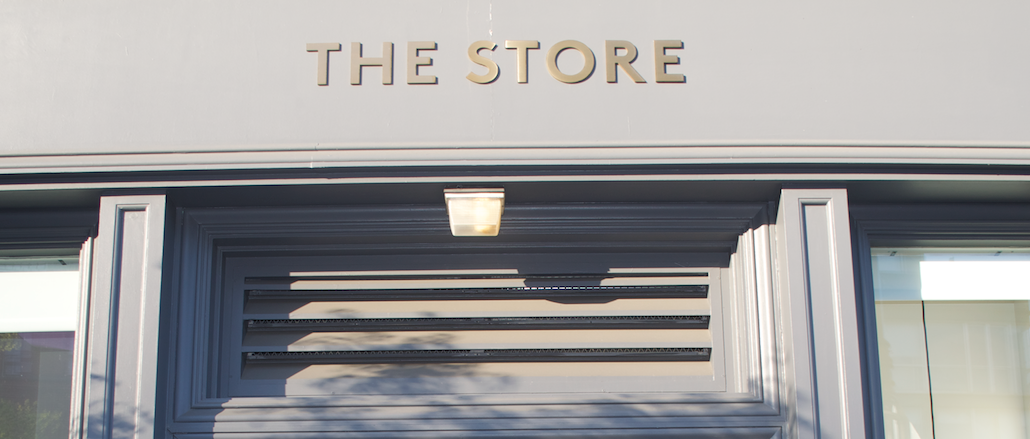
Advertising veteran Linus Karlsson knew he didn’t want his new design and tech agency to be, like so many, headquartered in a Midtown high-rise. He also loved the idea of having his own retail store, although he had “no idea” what he wanted to sell.
So for Ming Utility and Entertainment Group, Karlsson and his co-founders set up shop in a street-level storefront on the edge of Manhattan’s Financial District, where they combined a retail space with the agency’s work space.
The result is The Store, a sliver of real estate connected to Ming’s offices, where the team (Karlsson, Brian DiLorenzo, Tara DeVeaux and Brad Blondes) will sell designer collections that swap out on a three-month rotation. Right now, The Store has copper-plated cocktail shakers, candles assembled in London and a line of brass writing tools by British designer Tom Dixon.
The space invokes the feel of a gallery, and passersby are welcome to stop in and browse during store hours: 10 a.m. to 6 p.m. at 25 Peck Slip.

“I like the idea of being very tangible. People can walk in and say, ‘Hey, what are you doing?’” said Karlsson, who was named creative chairman at Commonwealth McCann in 2014 and previous owner of creative agency Mother. “They can come in and touch it, maybe say hi to it.”
Ming’s three pillars are design, entertainment and technology, according to Karlsson, but communication is at the company’s core, and the agency engages with clients by focusing on aspects of the industry that other agencies aren’t. That includes its environment: While other agencies put effort into done-up office spaces that sit removed from the streets, Ming is in the line of vision, inviting people in.

“Ming is in touch with the emotional side,” said Karlsson. “That’s why we wanted to be in a store front — so we could meet people who are coming in and browsing and buying stuff. ”
The Store opened last week with the collection from Dixon, an old friend of Karlsson’s.

“What interests me is not doing what other people are doing,” said Dixon. “It’s obviously a ridiculous idea for Linus to have a shop in the middle of an ad agency, so that’s what appeals. It doesn’t really make a lot of sense.”
Ming is an independent agency, but according to AdAge, the company will often partner with McCann Worldgroup on projects and have access to its resources. While Ming has freedom to work with brands outside of the group, it’s backed by the Interpublic Group of Cos.

The office space, where the team works with brands on visual projects, neighbors The Store, where a portion of Dixon’s collection of candles, barware and writing tools is currently on sale. Item prices range between $16.50 and $290. “I’ll be very interested to see if anyone walks in tomorrow and buys something,” he said.
It will be interesting, as The Store presents a retail experience that runs against the current of the rest of the industry, which Karlsson called “horrible.”
“We equal faster, better, more with progress, and that is not true,” he said. “I’m interested in learning more about the retail environment, and how that works and how we can make it better, because I don’t like it the way it is now.”

Attaching a retail space, one that shifts with each new designer it houses, to the street-level office space of a creative agency isn’t the most obvious combination, but according to Karlsson, that was the point.
“In advertising, we seek clarity too much,” he said. “But you don’t come out of a movie saying, ‘I love that movie, it was so clear.’ Humans love complexities and richness and layers.”

As for The Store, Karlsson said that he wasn’t sure how that complexity would translate in a commerce setting.
“I like a high-level abstraction; I find it very interesting. But it might not be so profitable.”

Pictures by Hilary Milnes
More in Marketing

WTF are tokens?
When someone sends a prompt or receives a response, the system breaks language into small segments. These fragments are tokens.

AI is changing how retailers select tech partners
The quick rise of artificial intelligence-powered tools has reshaped retailers’ process of selecting technology partners for anything from marketing to supply chain to merchandising.

YouTube’s upmarket TV push still runs on mid-funnel DNA
YouTube is balancing wanting to be premium TV, the short-form powerhouse and a creator economy engine all at once.





